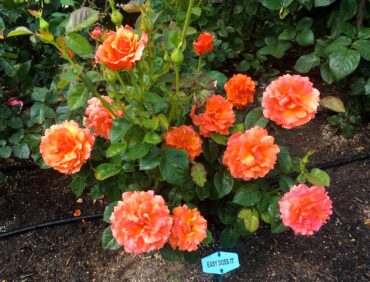
Roses are perennial shrubs and the modern varieties bloom continuously from late May until October, while many other perennial plants bloom only once each season. The past 20 years of rose hybridizing has produced many disease-resistant roses that will be in the regional market soon. Valley Nursery in Poulsbo and Raft Island Roses in Gig Harbor usually put a rose availability list on their websites for your convenience.
Look for modern roses hybridized within the past 20 years with known disease resistance. Read the nursery tag on any plant before purchasing.
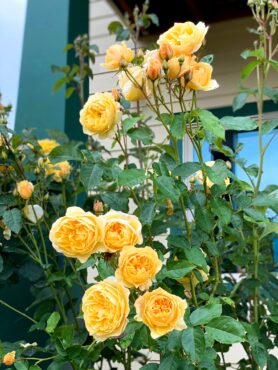
Consider these varieties when shopping for new roses.
Hybrid Teas
Many people love the one-bloom-per-stem roses that look like florist roses. Fortunately, there are some that are quite disease-resistant in our climate.
Disease-resistant doesn’t mean no disease will be seen. If you choose the planting location in an area with good air flow, you will see fewer problems. An occasional black-spot leaf should be trimmed off the plant and put in the trash.
August may bring powdery mildew but that, too, can just be trimmed off to avoid spreading to other roses. Don’t be afraid to prune your roses. The best blooms grow on new growth.
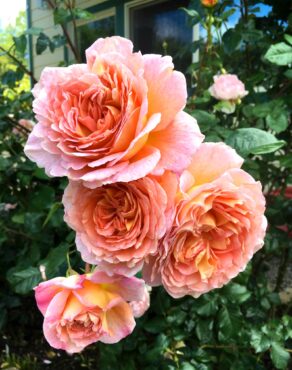
Hybrid teas to consider include:
- ‘Dark Desire’
- ‘Falling in Love’
- ‘Grand Amore’
- ‘Ingrid Bergman’
- ‘Pope John Paul II’
- ‘Sunny Sky’
Grandifloras and Floribundas
These are roses that produce large sprays with many blooms per cane. They look stunning in mixed perennial boarders. Plant them within easy distance of the garden edge or a path in a garden to make deadheading easy.
Look for these floribundas and grandifloras:
- ‘Day Breaker’
- ‘Dick Clark’
- ‘Easy Does It’
- ‘Julia Child’
- ‘Sexy Rexy’
- ‘South Africa’
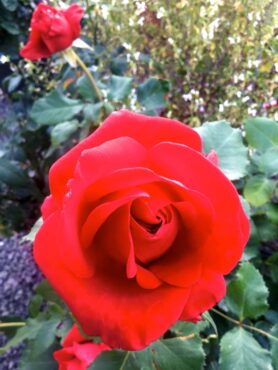
Shrub Roses
This group of roses includes Davis Austin English roses such as ‘Abraham Darby,’ classic shrubs and landscape roses. You may be familiar with the ‘Knock Out’ family or roses such as ‘Bonica’ and the ‘Drift” in the low-growing series. They’re generally known for their sturdy habit. Be sure to look for roses from this group introduced in the past 20 years.
Small or Miniature Roses
Two noteworthy additions to this class are both red. ‘Cherry Frost’ is a climbing miniature rose and ‘Petite Knock Out’ is from the disease-resistant ‘Knock Out’ family of roses. Both of these varieties have small flowers, 1 1/2 inches in diameter. Don’t be surprised to see ‘Petite Knock Out’ available at a big-box store this season.
Planting, Pruning and Care
Early March is the ideal time to add a rose or two to your landscape. Nurseries have a fresh selection to choose from and the ground is generally beginning to dry in West Sound.
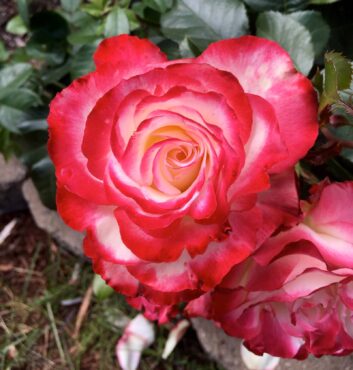
October is the ideal time to transplant roses from one spot to another, but that can also be successful in February or March, weather permitting.
Whether you add one rose in an existing bed or plant a dozen roses in one bed, follow these simple tips for success:
- In a rose that has three or more equal-sized canes and seems to be the most vigorous of the variety available. The size of the canes tells you something about the roots you can’t see. You will get a better-shaped plant in June if you take care in selection.
- Choose a spot with full sun, away from any competing tree or large shrub roots. If full sun is not possible, morning sun is the second best choice for a planting spot.
- Consider the need for water during the summer season. Roses need weekly water during the dry, warm months, especially their first year in the ground.

Now you are ready to plant that beautiful rose.
Your rose will get off to its best start if you dig a hole that is 2 feet diameter and 2 feet deep. Have a garden hose convenient, since you should water the rose in the middle of planting before it’s totally covered.
Don’t be tempted to put any chemical fertilizer in the hole — it will shock and kill the rose. Organics such as compost or alfalfa meal are the only additions to consider.
Some growers believe it’s best for the rose to only refill the hole with the native soil to encourage the roots to spread out. Your choice here; just stay away from chemicals at planting time.




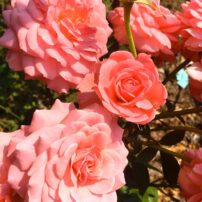

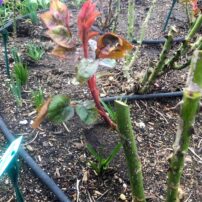
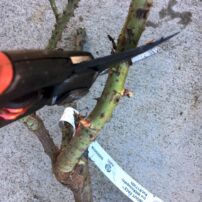
























Comments